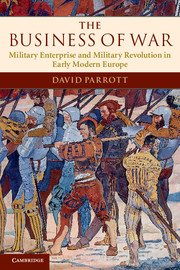Book contents
- Frontmatter
- Contents
- Figures
- Maps
- Acknowledgements
- Abbreviations
- Currencies
- Introduction
- Part I Foundations and expansion
- Part II Operations and structures
- 4 The military contractor at war
- 5 The business of war
- 6 Continuity, transformation and rhetoric in European warfare after 1650
- 7 Conclusion
- Notes
- Bibliography
- Index
7 - Conclusion
Published online by Cambridge University Press: 05 January 2015
- Frontmatter
- Contents
- Figures
- Maps
- Acknowledgements
- Abbreviations
- Currencies
- Introduction
- Part I Foundations and expansion
- Part II Operations and structures
- 4 The military contractor at war
- 5 The business of war
- 6 Continuity, transformation and rhetoric in European warfare after 1650
- 7 Conclusion
- Notes
- Bibliography
- Index
Summary
To win a war you do not need to score a ‘perfect ten’ in military excellence, you just have to perform better, perhaps less badly, than the enemy.
What has been insufficiently discussed . . . is the crucial evidence of the inefficiency, waste and the clear and straightforward corruption that for centuries has accompanied the preparations for war, to the point where it would perhaps be possible to write a ‘history of peculation’.
The traditional depiction of early modern military contracting bears some resemblance to accounts of the age of the dinosaurs which my generation encountered as children in the 1960s. Dinosaurs (then treated as a single generic life-form, like mercenaries and military contracting) were slow, lumbering and ineffectual. They survived essentially because at the outset they faced no serious competition, and by sheer size could dominate a given environment. But they were ‘obviously’ doomed to extinction when set against warm-blooded mammals with their adaptability, speed and evolutionary potential, and the story of the dinosaurs was presented as one of increasingly unsustainable developments in size, in ever-more elaborate defensive carapaces, horns and spikes, and ever-greater dependence on very specific conditions from which they could derive enough food for survival. The obvious question of why such self-evident evolutionary losers should have managed to dominate life on earth for 140 million years was just beginning to be asked at a popular level in the 1960s, but had not yet challenged the general assumptions which suggested that the story was one of physiological and adaptive failure.
Yet in subsequent decades understanding of dinosaurs has undergone a revolution. Lazy habits of speech ensure that the traditional associations and assumptions have not entirely vanished, but they coexist with a scientific consensus that the dinosaurs were extraordinarily adaptable, resilient forms of vertebrate life, able to dominate different environments, climates and competitors over unimaginably long periods of time. Military contracting, easily dismissed under the generalized and unspecific category of ‘(hiring) mercenaries’, is in need of a similar, more thoughtful evaluation.
- Type
- Chapter
- Information
- The Business of WarMilitary Enterprise and Military Revolution in Early Modern Europe, pp. 307 - 327Publisher: Cambridge University PressPrint publication year: 2012



